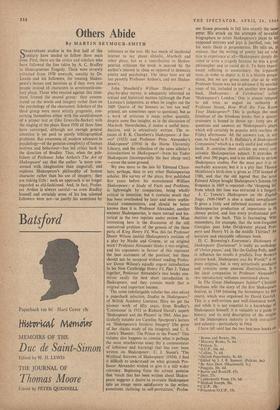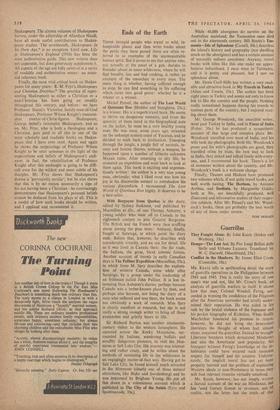Others Abide
By MARTIN SE YMOUR-SMITH SHAKESPEARE studies in the first half of this century have tended to follow three main lines. First, there are the critics and scholars who have followed the line taken by A. C. Bradley in Shakespearian Tragedy. These were severely criticised from 1930 onwards, notably by Dr. Leavis and his followers, for treating Shakes- peare's heroes and heroines as if they were real people instead of characters in seventeenth-cen- tury plays. Those who reacted against this treat- ment formed the second group: they concen- trated on the words and imagery rather than on the psychology of the characters. Scholars of the third group were more strictly pragmatic, con- cerning themselves either with the establishment of a proper text or (like Granville-Barker) with the staging of the plays. Since 1950 all three lines have converged, although not enough general attention is yet paid to purely bibliographical problems. But awareness of modern advances in psychology—of the genuine complexity of human motives and behaviour—has led critics back in the direction of Bradley. Thus, when the pub- lishers of Professor John Arthos's The Art of Shakespeare' say that the author 'is more con- cerned with imagination than stagecraft, and explores Shakespeare's philosophy of human character rather than his use of imagery,. they are risking little: such an approach is no longer regarded as old-fashioned. And, in fact, Profes- sor Arthos is always careful—as even Bradley himself and certainly some of his less talented followers were not—to justify his assertions by
reference to the text. He has much of incidental interest to say about Othello, Macbeth and other plays, but as a contribution to Shakes- pearian criticism the book is marred by the author's interest in ideas as opposed to dramatic poetry and psychology. The ideas here are all too patently Professor Arthos's, and not Shakes- peare's.
John Masefield's William Shakespeare,' a play-by-play survey, is adequately informed on textual and historical matters (although the Poet Laureate's judgments, as when he singles out the 1609 Quarto of the Sonnets as 'not too well' printed, are sometimes open to question), but as a work of criticism it reads rather quaintly, despite some fine insights, as in the discussion of Macbeth. Nevertheless, it makes a useful intro- duction, and is attractively written. The re- issues of E. K. Chambers's Shakespeare: A Sur- veys (1925) and Professor Peter Alexander's Shakespeare' (1954) in the Home University Library, and the collection of the same scholar's Introductions to Shakespeare'—from his Tudor Shakespeare (incomparably the best cheap text) —cover the same ground.
We owe more to the late Sir Edmund Cham- bers, perhaps, than to any other Shakespearian scholar. His survey of the plays, first published five years before his monumental William Shakespeare : a Study of Facts and Problems, is lightweight by comparison, being wholly critical in intention; but it contains much that has been overlooked by later and more sophis- ticated commentators, and should be better known than it is. Professor Alexander, another eminent Shakespearian, is more textual and his- torical in the two reprints under review. Most interesting here is the discussion of the still unresolved problem of the genesis of the three parts of King Henry VI. Was this (as Professor Dover Wilson insists) Shakespeare's revision of a play by Nashe and Greene, or an original work? Professor Alexander thinks it was original, and his arguments in favour of this represent the best statement of the position; but these should not be accepted without reading Profes- sor Dover Wilson's equally cogent introduction to his New Cambridge Henry VI, Part 2. Taken together, Professor Alexander's two books con- stitute easily the best short introduction to Shakespeare, and they contain much that is original and important besides.
The same indefatigable scholar has also edited a paperback selection, Studies in Shakespeare,' of British Academy Lectures. Here we get the pioneer work of fifty years, from Bradley's 'Coriolanus' in 1912 to Richard David's superb 'Shakespeare and the Players' in 1961. Also par- ticularly notable are Caroline Spurgeon's lecture on 'Shakespeare's Iterative Imagery' (the germ of her classic study of his imagery), and C. S. Lewis's 'Hamlet: The Prince or the Poem?' This volume also happens to contain what is perhaps the most mischievous essay (by a commentator of influence and learning) that has ever been written on Shakespeare: C. J. Sisson's 'The Mythical Sorrows of Shakespeare' (1934). 1 find it difficult to understand on what grounds Pro- fessor Alexander wished to give it a still wider currency. Beginning from the correct premise that 'much that has been written about Shakes- peare suggests a desire to re-create Shakespeare into an image more satisfactory to the writer, sometimes inclining to self-portraiture,' Profes- sor Sisson proceeds to fall into exactly the same error. His attack on the attempts of so-called biographers to relate Shakespeare's plays to his supposed sorrows and joys is justified, too; but his main thesis is preposterous. He tells us, in essence, that the writing of poetry has no rela- tion to experience at all—Shakespeare simply de- cided to write a tragedy because he was a great philosopher and so could do it. To have experi- enced suffering is unnecessary, the argument runs, in order to depict it. It is a bizarre propo- sition; but we are given some clue as to why Professor Sisson was led to advance it by another essay of his, included in yet another new paper- back, Shakespeare : A Celebration,' called 'Shakespeare's London.' One is almost tempted to ask even so august an authority as Professor Sisson, How Well Do You Know Your Shakespeare' This is perhaps the most frivolous of the frivolous books that a quater- centenary is bound to throw up: forty sets of questions and answers on Shakespeare's plays, which will certainly be popular with teachers on Friday afternoons. All the answers can, in any case, be found in F. E. Halliday's A Shakespeare Companion,' which is a really useful and valuable book. It contains short articles on every con- ceivable Shakespearian subject. It stretches to well over 500 pages, and is an addition to serious Shakespeare studies. For the most. part it is re' markably accurate; but it is a pity that Thomas Middleton's birth-date is given as 1570 instead of 1580, and that the old legend that the actor Edward Alleyn bought Shakespeare's Sonnets for fivepence in 1609 is repeated—the 'shopping list' from which this item was extracted is a forgerY. J. C. Trewin's Shakespeare on the English Stage, 1900-1964" is also a useful compilation. It gives a lively and informed account of every Shakespearian production of importance in its chosen period, and lists every professional pro- duction at the back. This is fascinating. Who remembers, for example, that the now-forgotten Georgian poet John Drinkwater played Pros- pero and Henry VI in the middle Thirties? An accurate and enjoyable reference hook. D. C. Browning's Everyman's Dictionary 01 Shakespeare Quotations" is really an anthology of 'choice pieces,' and, like the Gallup Polls, tends to influence the results it predicts. Ivor Brown's picture book, Shakespeare and his World," is [10 more original, but is very attractively produced and contains sonic unusual illustrations. It i5 the ideal companion to Professor Alexander's two introductory volumes mentioned above.
In The Great Shakespeare Jubilee" Christian Deelman tells the story of the first Shakespeare festival, in 1769 (missing the bicentenary by five years), which was organised by David Garrick. This is a well-written and well-illustrated book' and while it is not essential to a knowledge 01 Shakespeare himself, it is valuable as a guide to history, and its acid description of the origins of the Shakespeare industry is both instructive and salutary—particularly in 1964.
I have left until last the two best new books on
'Bowes and Bowes, 30s.
2 Mercury Books, 7s. 6d.
'Pelican, 5s.
O.U.P., 10s. 6d.
5Collins, 7s. 6d..
Oxford Paperbacks, 8s. 6d.
7 Edited by J. J. B. Spencer. (Pelican, 6s.) 8 By Alan Dent. (Macdonald, 5s.) 9 Penguin, 10s. 6d.
10 Barrie and Rockliff, 45s. " Dent, 25s.
"Lutterworth Press, I3s. 6d. 15 Michael Joseph, 30s.
14 C.U.P., 50s.
l'Princoton/O.U.P., 35s.
Shakespeare. The, sixteen volumes of Shakespeare Survey, under the editorship of Allardyce Nicoll, have all made useful contributions to Shakes- peare studies. The seventeenth, Shakespeare in his Own Age," is no exception. Until now, Life In Shakespeare's England (1916) has been the most authoritative guide. This new volume does not supersede, but does generously supplement it. All aspects of the age are fully covered in a series of readable and authoritative essays: an essen- tial reference book.
Finally, the most vital critical book on Shakes- peare for many years: R. M. Frye's Shakespeare and Christian Doctrine." The practice of repre- senting Shakespeare as either a Christian or a non-Christian has been going on steadily throughout this century, and before: we have Professor Sisson's Victorian family-man-of-God Shakespeare, Professor Wilson Knight's transcen- dent creator-of-Christ-figures Shakespeare, George Seibel's rationalist Shakespeare, and so on. Mr. Frye, who is both a theologian and a Christian, puts paid to all this in one of the most scholarly and readable books on Shakes- peare that I have ever read. Again and again he shows the outpourings of Professor Wilson Knight to be utter nonsense in the light of the expectations and beliefs of Shakespeare's audi- ence; in fact, the rehabilitation of Professor Knight after this onslaught is going to be diffi- cult even for the wildest and most subtle of his disciples. Mr. Frye shows that Shakespeare's drama is 'pervasively secular'; but he also shows that this is by no means necessarily a sign of his not having been a Christian—he convincingly demonstrates that Shakespeare's personal beliefs cannot be deduced from his plays at all. This is a model of how such books should be written, and I applaud and recommend it.







































 Previous page
Previous page